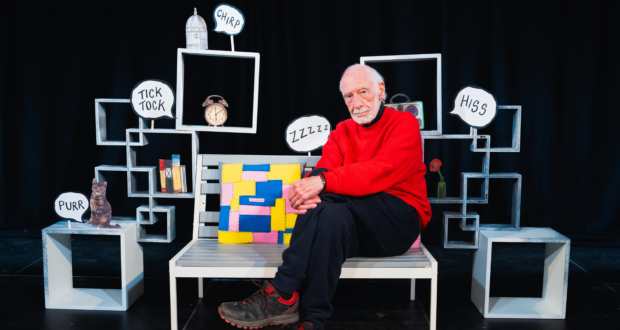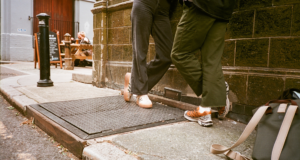Roger McGough talks about The Sound Collector
My fellow scouser Roger McGough (OBE no less, plus a fellow of the Royal Society of Literature!) is an absolute icon in the poetry world. His book The Mersey Sound, written with Brian Patten and Adrian Henri, was key in transforming poetry during the 1960s and has sold over one million copies. He’s not only a poet but a celebrated musician, broadcaster and playwright. And for me as a reviewer of children’s theatre, it’s super exciting to know that he is currently creating stage shows for children with the amazing Jam Jar Productions. Last year’s production Money-Go-Round received tremendous critical acclaim and even won the Best Children’s Show award at the Edinburgh Fringe.
And now I’m hugely over-excited because we get to talk with the fabulous Mr McGough, and ask him about this year’s production, The Sound Collector.
Roger, it’s so fantastic to chat with you today about this new family show, The Sound Collector. Can you tell us about the poem it’s based on and how it lends itself to the musical?
The poem has been around for a long time and it’s become very popular with schools. Often I have teachers sending me versions of it that the children have written. And that’s what you want to do with a poem: you want them to say ‘Oh, I can do that’, or be inspired by it to do something themselves. Poetry is not for the elite, it’s for everybody. The thing is – it’s hardly sinister, but there’s this horrible character, and it’s up to the children how they see it. The play is actually based on two characters. One is a blind musician, although initially I wrote it as just a person. I’m probably more interested in the neighbour. She’s an influencer, and you know how kids can be now – so competitive about online stuff: you’ve got to be beautiful, you’ve got to be clever. And we’re not – we’re ordinary. I just wanted to say that. This influencer ends up saying ‘I look like a princess on TikTok, but I’m really not’. She ends up with her friends and there’s a message we have to look out for each other. The important things are what we get from each other and our children, really.
You’ve worked with Jam Jar Productions with great success on Money-Go-Round last year. Is this the same team, and how has it been working with them again?
Yes, the same team. It’s great working with my friends. Steve Halliwell has put some lovely music into the show, and the same with Jonny Danciger – he’s a really good director. His passion is actually as a sound engineer, so this sort of thing is right up his street, introducing interesting sound into the show. And we had to decide how much do you make the sound and how much do you leave it to the audience’s imagination? Also, poetry feeds into the descriptions – like the wind rustling through the trees – and the words do some of the sound work. We’re a good team, finding the balance between what is created, how it’s created and what’s left to do in the imagination. We play to what we’re good at and it all comes together to produce something, hopefully, very good.
How do you make such a short piece of verse into an hour long show?
Well, I can tell you how I’ve done it but don’t tell anyone! [Ed: Oops! Sorry Roger but here goes!] By adding other poems. When I look at my ‘oeuvre’, let’s call it, there are lots of poems that are all about the same thing in a way. There’s also one called ‘The Colour Collector’. In a sense if you’re blind the Sound Collector is very important to you, if you’re visual the Colour Collector is dangerous as well. You can lose that sense of seeing things. So, lots of poems there about the senses. I’ve got all these poems out there and once you start thinking about it they come together and help each other out, you know?
One of your most celebrated plays was an adaptation of Molière’s classic Tartuffe, translated from French into your own verse and prose. Sounds tricky, but is it possibly harder to make work for a brutally honest young audience?
Well, critics can be brutally honest as well, as you know. When I was asked to do Tartuffe, I thought “I can’t do this. I’m not clever enough. I’m from Liverpool. I didn’t go to Cambridge. I’m a linguist.” All those things. And then you have a go, and when I started doing it I realised I was good at it. I gave a nod, of course, to Molière, and he agreed with me I’d have a go – and I enjoyed doing it. I let the characters take over and work into the prose and verse. But you do something like that and you’re very aware it’s something an adult would enjoy – although kids came too and they enjoyed it. Anyway, I pulled that one off. Now with this piece for children, the work’s more playful really. We’ll see. Hopefully they’ll enjoy this play, and the kids, their mums and dads will take some of the poetry and songs along home with them – share the experience. I’m sure they’ll tell me what they think!
Work for children is often considered the poor relative in theatrical terms, so it’s fantastic to see someone with your literary pedigree creating tailored pieces for young people. What’s your motivation?
Interesting you say that. I’ll tell you why, possibly why, people don’t do this work – because I don’t think there’s much money in it. If you want stardom, or you want whatever, I know you don’t write children’s plays. You do it because you do it. And you remember the child within yourself and want to please others and make them happy, in a sense. It would be nice if my work gets out there and it reaches people. But I’d never thought it’d do that, actually, looking back. Never thought ‘Lily the Pink’ would reach number one but it did!
What reactions do you hope to have from your audiences?
They’ll be chilled when the Sound Collector moves amongst them in the auditorium in darkness. They’ll laugh at the gags, and there’s a few grown-up gags thrown in. They’ll feel sorry for the influencer and laugh at the magic. They’ll join in the poems. The actors enjoy it when the kids can see what’s coming, and that sort of stuff. There are some surprises, and they’ll maybe whistle the tunes when they go away.
I love it when I hear from a school group afterwards and the kids have sent me packages and poems with their own versions of a show. It reflects their own lives and that’s special. It makes me laugh! And now when I do poetry reading and book signings people come up to me and say “You came to our school” or “I read your poem when I was at school”, and these people are quite old now – 60s or 70s maybe, so that’s an impact across a lifetime, which is great.


And the million dollar question, where will The Sound Collector be going to after OSO Arts Centre?
It’s going to Glastonbury and so am I! Bloody hell! I’ve signed up for it – I don’t know why. In a moment of madness! I’m doing an adults’ show and a kids’ one as well. And then we’re setting The Sound Collector up for a tour early next year, which I’m leaving to the guys at Jam Jar to organise.
It’s such a pleasure to hear from Roger on this fabulously fun new show, and we wish the whole team well with the project. As we say in Liverpool, ta la!
Roger McGough’s The Sound Collector plays at OSO Arts Centre from 11-12 May and details can be found here.
 Everything Theatre Reviews, interviews and news for theatre lovers, London and beyond
Everything Theatre Reviews, interviews and news for theatre lovers, London and beyond





2 comments
Pingback: Review: The Sound Collector, OSO Arts Centre - Everything Theatre
Pingback: Evaluation: The Sound Collector, OSO Arts Centre - fridaywebseries.com